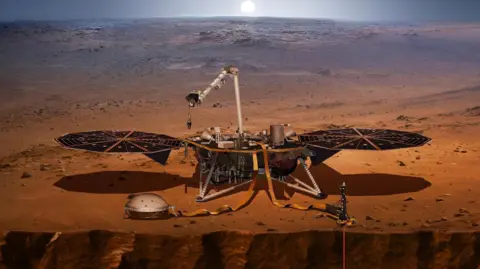
This is actually good news for a future establishment of a full on Martian habitat. And getting to it will involve driving an incline tunnel many miles long that simply reaches the water saturated material. It may even be hot, but compression will still be moderate. On Earth we get a mile down easily enough and five miles by drilling.
My point is that rock failure is our limiting factor. And that is countered by hydraulic pressure. So we do have to drive an incline adit to reach a depth close enough to also drill vertically. If we can we can establish a cap and then drop the floor of a large cylinder shaft which can be used to house us as well.
Just going big makes it work well and reaching water once you have water becomes real easy.
this also tells us that surface traps may well exist.
The main take home is that while we will still want artificial gravity, large underground bases or habitats on Mars will be practical. All this holds true for other small planets likely..
Reservoir of liquid water found deep in Martian rocks
Victoria Gill
Science correspondent, BBC News•@vic_gill
NASA
The discovery comes from analysis of data from Nasa's Insight lander, which took a seismometer to Mars
Scientists have discovered a reservoir of liquid water on Mars - deep in the rocky outer crust of the planet.
The findings come from a new analysis of data from Nasa’s Mars Insight Lander, which touched down on the planet back in 2018.
The lander carried a seismometer, which recorded four years' of vibrations - Mars quakes - from deep inside the Red Planet.
Analysing those quakes - and exactly how the planet moves - revealed "seismic signals" of liquid water.
The Insight mission set out to investigate the evolution of rocky planets, including Earth and Mars
While there is water frozen at the Martian poles and evidence of vapour in the atmosphere, this is the first time liquid water has been found on the planet.
The findings are published in the Proceedings of the National Academy of Sciences.
Insight's scientific mission ended in December 2022, after the lander sat quietly listening to "the pulse of Mars" for four years.
In that time, the probe recorded more than 1,319 quakes.
By measuring how fast seismic waves travel, scientists have worked out what material they are most likely to be moving through.
"These are actually the same techniques we use to prospect for water on Earth, or to look for oil and gas," explained Prof Michael Manga, from the University of California, Berkeley, who was involved in the research.
The analysis revealed reservoirs of water at depths of about six to 12 miles (10 to 20km) in the Martian crust.
“Understanding the Martian water cycle is critical for understanding the evolution of the climate, surface and interior,” said lead researcher Dr Vashan Wright, from UC San Diego’s Scripps Institution of Oceanography.
Prof Manga added that water was "the most important molecule in shaping the evolution of a planet". This finding, he said, answers a big question of "where did all the Martian water go?".
Studies of the surface of Mars - with its channels and ripples - show that, in ancient times, there were rivers and lakes on the planet.
But for three billion years, it has been a desert.
Some of that water was lost to space when Mars lost its atmosphere. But, said Prof Manga, here on Earth, "much of our water is underground and there's no reason for that not to be the case on Mars too".

Nasa
The Martian surface has evidence of ancient rivers and lakes etched into it
The Insight probe was only able to record directly from the crust beneath its feet, but the researchers expect that there will be similar reservoirs across the planet. If that is the case, they estimate that there is enough liquid water on Mars to form a layer across the surface that would be more than half a mile deep.
However, they point out, the location of this Martian groundwater is not good news for billionaires with Mars colonisation plans who might want to tap into it.
"It's sequestered 10-20km deep in the crust," explained Prof Manga.
"Drilling a hole 10km deep on Mars - even for [Elon] Musk - would be difficult," he told BBC News.
The discovery could also point to another target for the ongoing search for evidence of life on Mars.
"Without liquid water, you don't have life," said Prof Manga. "So if there are habitable environments on Mars, those may be now deep underground."
No comments:
Post a Comment